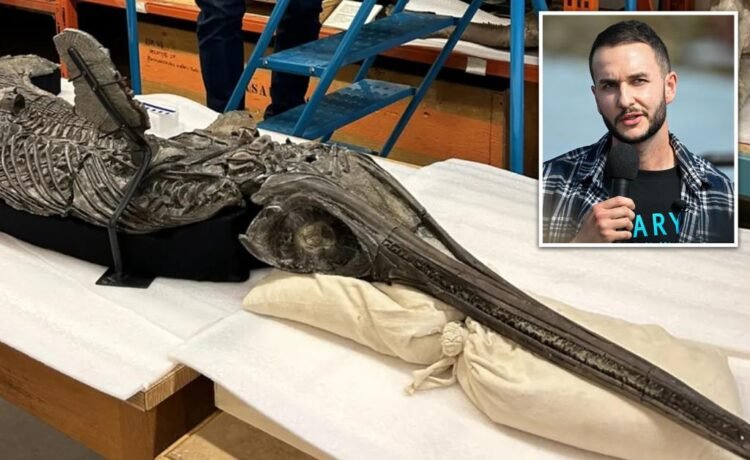
A fossil unearthed along the coast of England was identified as a new species of a renowned “sword dragon” reptile that dominated the sea during the Jurassic Period.
The nearly complete ichthyosaur fossil was dubbed the Xiphodracon goldencapensis, formally translating to the “sword dragon of Dorset,” after it was discovered on the Jurassic coast in the sleepy English county.
The ichthyosaur was a type of marine reptile that looked like a cross between a shark, barracuda, and swordfish. The one dug up in Dorset had marks along its skull that suggested a predator may have bitten its head and killed it, the team behind the discovery wrote in a paper published Thursday.
The fossil was first discovered in 2001 and passed around between museums before experts were finally able to analyze it this year.
The scientists said that the ichthyosaur is classified as a marine reptile instead of a stereotypical dinosaur because it can only live in the water. The one they discovered was estimated to be 185 million years old — long before the species’ population spiked.
“It’s a missing piece of the puzzle in the ichthyosaur evolution,” Dr. Dean Lomax, who co-authored the paper, said.
Their newly ID’d reptile was roughly 3 meters long and boasted features lacking in most ichthyosaurs, including a prong-like nose near its nostrils, a single gargantuan eye socket, and a sharper snout used to spear prey.
“The limb bones and teeth are malformed in such a way that points to serious injury or disease while the animal was still alive,” study co-author Dr Erin Maxwell explained.
Many other remains of different ichthyosaurs have washed up on Dorset’s Jurassic coast over the years. Fossil hunter Chris Moore, who is credited with finding the Xiphodracon goldencapensis fossil, told the BBC that he’s unearthed 15 others since.
“I don’t wish to blow my own ichthyosaur trumpet, but I have found a few of them,” he joked.
Moore, on his end, said he plans on celebrating the groundbreaking discovery with “champagne or a mug of tea.”
In 2023, another group of researchers identified a fossil dug up on Dorset’s Jurassic coast as a close “sister” of the modern-day crocodile — just without a front pair of legs.
The Turnersuchus hingleyae existed during the same era as the Xiphodracon goldencapensis, but was on average a whole meter smaller.








Recent Comments